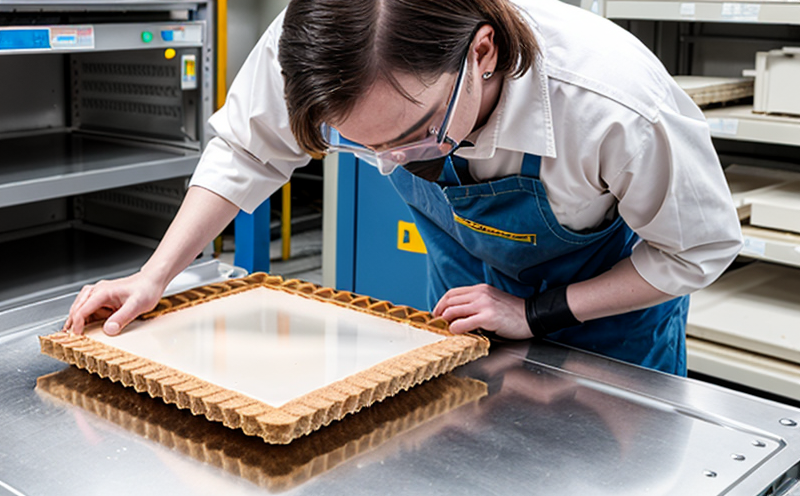SEMI M56 Wafer Resistivity Measurement Testing
The SEMI M56 standard is a critical component in the semiconductor industry’s quality control and process optimization efforts. This service focuses on measuring wafer resistivity, which is fundamental for ensuring that wafers meet specifications necessary for integrated circuit fabrication.
Resistivity testing plays a pivotal role in the early stages of semiconductor manufacturing as it helps identify potential issues with the raw materials used to produce silicon wafers and other substrates. By accurately measuring resistivity, manufacturers can ensure that their products are within acceptable tolerances set by industry standards like SEMI M56.
Accurate resistivity measurements are essential because they directly impact how well semiconductors function in various applications such as power devices or logic circuits. Variations in resistivity could lead to performance discrepancies across different batches of wafers, which would be unacceptable for the semiconductor industry’s high-reliability requirements.
The SEMI M56 standard provides detailed guidelines on how to perform these tests using specific equipment and procedures. It ensures consistency among laboratories conducting similar analyses worldwide, thereby enhancing trust in cross-border supply chains within the electronics manufacturing sector.
Our laboratory adheres strictly to this standard when performing resistivity measurements on wafers or substrates provided by clients from diverse industries including automotive, telecommunications, consumer electronics, and more. We use state-of-the-art instrumentation calibrated according to international standards like ISO 9001:2015 for quality assurance.
Preparation steps include cleaning the surface of the wafer thoroughly before placing it into our resistivity measuring device. After obtaining initial readings from multiple points across each wafer, we calculate an average value that represents overall consistency within batches.
The SEMI M56 protocol specifies precise procedures for sampling and handling wafers to minimize any contamination or damage during testing. This ensures accurate results without introducing external variables into the process.
Results from our tests are reported back to clients via detailed certificates of analysis (CoA), which include all relevant data points such as temperature conditions, sample preparation methods used, and final calculated resistivity values along with their respective tolerances.
This level of precision is crucial for ensuring that semiconductor manufacturers can maintain consistent product quality throughout production cycles. It also facilitates easier traceability of any issues encountered during manufacturing processes back to specific batches or lots of materials sourced from suppliers.
By adhering strictly to SEMI M56 standards, we provide reliable resistivity measurements that contribute significantly towards maintaining high levels of reliability and performance in semiconductor products.
Scope and Methodology
The scope of our SEMI M56 wafer resistivity measurement testing encompasses a range of services designed to meet the stringent requirements set forth by this industry standard. Our methodology involves several key steps:
- Sampling: We follow precise sampling protocols outlined in SEMI M56 to ensure that representative samples are taken from each batch of wafers or substrates.
- Cleaning: Prior to testing, all surfaces are cleaned meticulously using appropriate solvents and techniques specified by the standard.
- Measurement: Using advanced equipment calibrated according to international standards like ISO 9001:2015, we perform multiple resistivity measurements across various points on each wafer or substrate.
- Data Analysis: After collecting all necessary data points, statistical analysis is performed to determine the average resistivity value for each sample batch.
This comprehensive approach guarantees accurate and reliable results that comply with SEMI M56 specifications. Our team of experienced professionals ensures that every step adheres meticulously to best practices recommended by this standard.
International Acceptance and Recognition
The SEMI M56 wafer resistivity measurement testing is widely accepted across the global semiconductor industry due to its robustness and reliability. This standard has been recognized internationally for providing consistent methods of assessing wafer resistivity, making it an indispensable tool in ensuring quality control during production processes.
Many leading companies from various countries rely on SEMI M56-compliant laboratories like ours to verify the integrity of their raw materials before incorporating them into finished products. The widespread adoption of this standard reflects its importance in maintaining high standards across borders.
Apart from being a benchmark for internal quality assurance within semiconductor firms, SEMI M56 is also utilized by regulatory bodies responsible for overseeing compliance with environmental and safety regulations applicable to electronic manufacturing operations globally.
The international recognition extends beyond just the semiconductor sector; it has applications in related fields such as photovoltaics where accurate resistivity measurements are crucial for optimizing efficiency of solar cells. By adhering to SEMI M56 guidelines, laboratories like ours contribute significantly towards fostering a standardized approach that benefits all stakeholders involved.
Our commitment to upholding these standards ensures that our clients receive precise and trustworthy data which can be relied upon when making important decisions regarding their supply chains and product development strategies.
Use Cases and Application Examples
- Wafer Fabrication: During the initial stages of wafer fabrication, resistivity testing helps identify any defects or inconsistencies in the raw materials used. This ensures that only high-quality wafers proceed further into the production cycle.
- Purity Verification: By measuring the resistivity of different layers within a single wafer, manufacturers can verify whether they are free from impurities that might affect performance negatively.
- Thermal Characterization: Understanding how temperature affects resistivity allows for better design and optimization of thermal management systems in semiconductor devices.
- Process Optimization: Regular monitoring of wafer resistivity can help pinpoint areas where process improvements are needed to enhance overall yield rates without compromising quality standards.
- Supplier Evaluation: For procurement teams, SEMI M56-compliant testing provides an objective measure of supplier performance ensuring consistent supply chain reliability.
- New Material Development: In R&D environments, this test is vital for evaluating new materials being considered for use in future generations of semiconductors.
The data generated from our SEMI M56 compliant testing plays a crucial role in these applications by providing accurate insights into the physical properties of wafers and substrates. This information supports informed decision-making processes throughout product lifecycle management activities.





